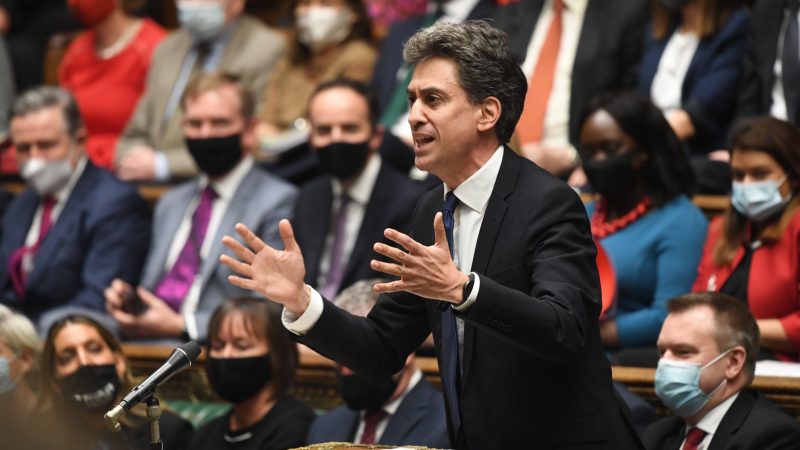
Labour will attempt to use an opposition day debate to force a vote on scrapping VAT on home energy bills over the next year, as the party urges the Tories to back the move in a bid to help “hard-working people face a growing cost of living crisis”.
Ahead of the debate on Tuesday afternoon, when the opposition party will bring its motion, Ed Miliband called on Conservative MPs who have previously backed cutting VAT on home energy bills to “follow through with their promises”.
Opposition day motions are not directly binding on the government, but this motion would guarantee time in the parliamentary schedule for a bill proposing the cut to VAT, which would force MPs to actively vote for or against the legislation.
Rachel Reeves announced over the weekend that the Labour Party would fund its bid to reduce the expected price rise in April with a one-off windfall tax on North Sea oil and gas producers that have profited from recent record-high prices.
Government minister and former oil industry adviser Nadhim Zahawi rejected the idea on Sunday, telling LBC Radio listeners that the proposed tax “just doesn’t add up”. He claimed that the companies are “already struggling”.
Miliband, Labour’s Shadow Climate Change and Net Zero Secretary, said: “The Conservatives’ clear opposition to the windfall tax tells you exactly whose side they are on – and it’s not the British people struggling with their energy bills.
“It tells you everything you need to know about this government that they believe we should prioritise oil and gas companies making huge windfall profits that they say are ‘struggling’, rather than the British people who face the true struggle to pay their energy bills.”
International pressure on energy supplies in recent months has caused home energy bills to rise significantly in the UK. Trade body Energy UK has predicted that gas and electricity bills could rise by a further 50% by April.
Energy regulator Ofgem increased the energy price cap in October to £1,138 a year. The move reduced the financial burden on energy companies but resulted in consumers across the country being switched over to increased rates or tariffs.
“Labour will stand up for the millions of families across the country, with a package that won’t just help the average household with around £200 off bills, but also targeted and focused support for those who need it most – including low earners, pensioners and the squeezed middle – with up to £600 in total off their bills,” Miliband added.
Shadow Chancellor Reeves told the BBC’s Sunday Morning show that a “decade of dither and delay” from Conservative governments on reforming the energy sector was to blame for the current “cost of living crisis”.
Labour has said it would “reduce Britain’s reliance on imported gas” by “accelerating home-grown renewables and new nuclear”, retrofit 19 million homes over a decade via grants and loans, and reform the “broken” energy system with better regulation of the market.
Boris Johnson and Michael Gove wrote in The Sun during the Brexit campaign: “Fuel bills will be lower for everyone. In 1993, VAT on household energy bills was imposed. This makes gas and electricity much more expensive… When we Vote Leave, we will be able to scrap this unfair and damaging tax.”
But the Prime Minister rejected cutting VAT to help struggling families last week. He argued that the policy is a “blunt tool”, adding: “The difficulty is that you end up also cutting fuel bills for a lot of people who perhaps don’t need the support in quite the direct way that we need to give it.”
Below is the text of Labour’s motion on VAT on household energy bills.
That this House calls on the government to cut the rate on VAT for household energy bills immediately; and makes provision as set out in this Order:
(1) On Tuesday 1 February 2022:
(a) Standing Order No. 14(1) (which provides that government business shall have precedence at every sitting save as provided in that order) shall not apply;
(b) any proceedings governed by this order may be proceeded with until any hour, though opposed, and shall not be interrupted;
(c) the Speaker may not propose the question on the previous question, and may not put any question under Standing Order No. 36 (Closure of debate) or Standing Order No. 163 (Motion to sit in private);
(d) at 3.00 pm, the Speaker shall interrupt any business prior to the business governed by this order and call the Leader of the Opposition or another Member on his behalf to present a Bill concerning a reduction in Value Added Tax on energy of which notice of presentation has been given and immediately thereafter (notwithstanding the practice of the House) call a Member to move the motion that the Value Added Tax (Energy) Bill be now read a second time as if it were an order of the House;
(e) in respect of that Bill, notices of Amendments, new Clauses and new Schedules to be moved in Committee may be accepted by the Clerks at the Table before the Bill has been read a second time.
(f) any proceedings interrupted or superseded by this order may be resumed or (as the case may be) entered upon and proceeded with after the moment of interruption.
(2) The provisions of paragraphs (3) to (18) of this order shall apply to and in connection with the proceedings on the Value Added Tax (Energy) Bill in the present Session of Parliament.




More from LabourList
‘Energy efficiency changes must work for older private renters’
‘Labour’s creative destruction dilemma’
Economic stability for an uncertain world: Spring Statement 2026